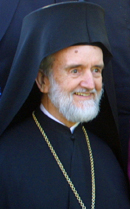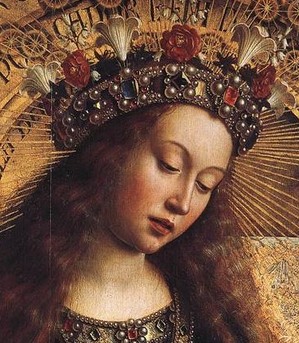As point of clarification, CL is not a “lay ecclesial movement”; it is technically improper to call the ecclesial movements “lay ecclesial movements” because the movements are not limited to the lay faithful, but are open to the ordained as well. Many of the movements have ardent followers who are deacons, priests and bishops in the movements. Therefore, not “lay ecclesial.”
A walk to Defeat ALS in New Haven, September 16
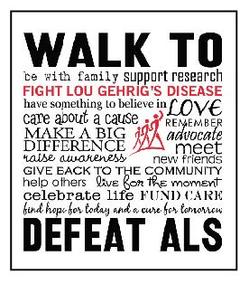 My friend Father David Bornio sent me this note asking to kindly to get the word out. If you live in the New Haven area, please consider walking to Defeat ALS.
My friend Father David Bornio sent me this note asking to kindly to get the word out. If you live in the New Haven area, please consider walking to Defeat ALS.A walk to Defeat ALS will
be held Sunday, September 16, 2012 at Lighthouse Point Park New Haven, CT
06512.
register now, visit or call 203-874-505.
to Defeat ALS fund vital services for Connecticut patients and families living
with ALS, also known as Lou Gehrig‘s disease, and support research to find a
cure. Volunteers and donations would be greatly appreciated.
Association Connecticut Chapter is located at 4 Oxford Rd., unit D4 Milford, CT
06460. Please direct donations to (heavens hopefuls).
Elise, Deacon Horace Harmor, Father David Borino and many of our New Haven friends are living with this illness.
1508 times for his team. How about walking once for ours?
Saint Louis
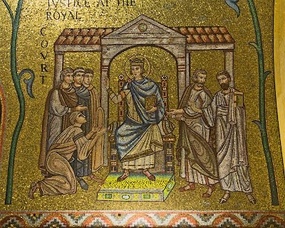 Saints come from all walks of life. We’ve got every group represented in the group of canonized. Today is the feast of a saint of a rare group –a king. The Church honors King Saint Louis IX.
Saints come from all walks of life. We’ve got every group represented in the group of canonized. Today is the feast of a saint of a rare group –a king. The Church honors King Saint Louis IX.
Saint Bartholomew
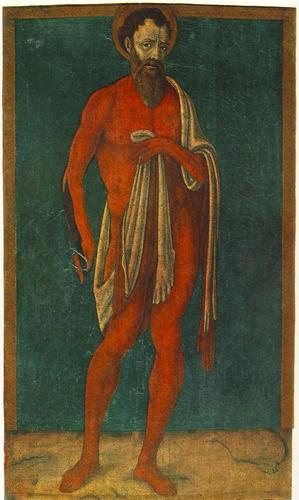 Nathanael was one of Christ’s first converts, yet his name does not occur again till the last chapter of St. John’s Gospel, where he is mentioned in company with certain of the Apostles, to whom Christ appeared after His resurrection. Now, why should the call of Nathanael have been recorded in the opening of the Gospel, among the acts of Christ in the beginning of His Ministry, unless he was an Apostle? Philip, Peter, and Andrew, who are mentioned at the same time, were all Apostles; and Nathanael’s name is introduced without preface, as if familiar to a Christian reader. At the end of the Gospel it appears again, and there too among Apostles. Besides, the Apostles were the special witnesses of Christ, when He was risen. He manifested Himself, “not to all the people,” says Peter, “but unto witnesses chosen before of God, even to us, who did eat and drink with Him after He rose from the dead.” [Acts x. 41.] Now, the occasion on which Nathanael is mentioned, was one of these manifestations. “This is now the third time,” says the Evangelist, “that Jesus was manifested to His disciples, after that He was risen from the dead.” It was in the presence of Nathanael, that He gave St. Peter his commission, and foretold his martyrdom, and the prolonged life of St. John. All this leads us to conjecture that Nathanael is one of the Apostles under another name. Now, he is not Andrew, Peter, or Philip, for they are mentioned in connexion with him in the first chapter of the Gospel; nor Thomas, James, or John, in whose company he is found in the last chapter; nor Jude (as it would seem), because the name of Jude occurs in St. John’s fourteenth chapter. Four Apostles remain, who are not named in his Gospel,–St. James the Less, St. Matthew, St. Simon, and St. Bartholomew; of whom St. Matthew’s second name is known to have been Levi, while St. James, being related, was not at any time a stranger to our Lord, which Nathanael evidently was. If then Nathanael were an Apostle, he was either Simon or Bartholomew. Now it is observable, that, according to St. John, Philip brought Nathanael to Christ; therefore Nathanael and Philip were friends: while in the other Gospels, in the list of Apostles, Philip is associated with Bartholomew; “Simon and Andrew, James and John, Philip and Bartholomew.” [Matt. x. 3.] This is some evidence that Bartholomew and not Simon is the Nathanael of St. John. On the other hand, Matthias has been suggested instead of either, his name meaning nearly the same as Nathanael in the original language. However, since writers of some date decide in favour of Bartholomew, I shall do the like in what follows.
Nathanael was one of Christ’s first converts, yet his name does not occur again till the last chapter of St. John’s Gospel, where he is mentioned in company with certain of the Apostles, to whom Christ appeared after His resurrection. Now, why should the call of Nathanael have been recorded in the opening of the Gospel, among the acts of Christ in the beginning of His Ministry, unless he was an Apostle? Philip, Peter, and Andrew, who are mentioned at the same time, were all Apostles; and Nathanael’s name is introduced without preface, as if familiar to a Christian reader. At the end of the Gospel it appears again, and there too among Apostles. Besides, the Apostles were the special witnesses of Christ, when He was risen. He manifested Himself, “not to all the people,” says Peter, “but unto witnesses chosen before of God, even to us, who did eat and drink with Him after He rose from the dead.” [Acts x. 41.] Now, the occasion on which Nathanael is mentioned, was one of these manifestations. “This is now the third time,” says the Evangelist, “that Jesus was manifested to His disciples, after that He was risen from the dead.” It was in the presence of Nathanael, that He gave St. Peter his commission, and foretold his martyrdom, and the prolonged life of St. John. All this leads us to conjecture that Nathanael is one of the Apostles under another name. Now, he is not Andrew, Peter, or Philip, for they are mentioned in connexion with him in the first chapter of the Gospel; nor Thomas, James, or John, in whose company he is found in the last chapter; nor Jude (as it would seem), because the name of Jude occurs in St. John’s fourteenth chapter. Four Apostles remain, who are not named in his Gospel,–St. James the Less, St. Matthew, St. Simon, and St. Bartholomew; of whom St. Matthew’s second name is known to have been Levi, while St. James, being related, was not at any time a stranger to our Lord, which Nathanael evidently was. If then Nathanael were an Apostle, he was either Simon or Bartholomew. Now it is observable, that, according to St. John, Philip brought Nathanael to Christ; therefore Nathanael and Philip were friends: while in the other Gospels, in the list of Apostles, Philip is associated with Bartholomew; “Simon and Andrew, James and John, Philip and Bartholomew.” [Matt. x. 3.] This is some evidence that Bartholomew and not Simon is the Nathanael of St. John. On the other hand, Matthias has been suggested instead of either, his name meaning nearly the same as Nathanael in the original language. However, since writers of some date decide in favour of Bartholomew, I shall do the like in what follows.
What then do we learn from his recorded character and history? It affords us an instructive lesson. When Philip told him that he had found the long-expected Messiah of whom Moses wrote, Nathanael (that is, Bartholomew) at first doubted. He was well read in the Scriptures, and knew the Christ was to be born in Bethlehem; whereas Jesus dwelt at Nazareth, which Nathanael supposed in consequence to be the place of His birth,–and he knew of no particular promises attached to that city, which was a place of evil report, and he thought no good could come out of it.
Philip told him to come and see; and he went to see, as a humble single-minded man sincerely desirous to get at the truth. In consequence, he was vouchsafed an interview with our Saviour, and was converted.
Blessed John Henry Newman
Plain and Parochial Sermons
Remembering the Future…John Zizioulas’ new book
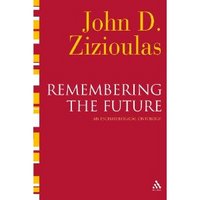 The predominating concept in theological ontology is
The predominating concept in theological ontology is
that of a protological ontology which defines being itself as being defined by
the past. The future of things in this perspective is defined by its origins
and the “given” or the “factum”. In this major new book
John Zizioulas shows that eschatology can have important implications for
ontology, i.e. for being itself. The world was created with a purpose and the
end which would be greater than the beginning. This is the view of the Fathers,
such as Irenaeus and Maximus, who made the end the “cause of all
being”. The implications of such an idea are revolutionary, both
historically and experientially. It represents a reversal of the ancient
philosophical idea of causality as well as of our common sense rationality,
according to which the cause precedes chronologically as well as logically. It
is the opposite of protological ontology, which makes the past decisive for the
future. Eschatological ontology, therefore, is about the liberation of being
from necessity, it is about the formation of being. Man and the world are no
longer imprisoned in their past, in sin, decay and death. The past is
ontologically affirmed only in so far as it contributes to the end, to the
coming of the kingdom. The eschaton will ‘judge’ history with this criterion
alone. The last judgment as part of the eschaton represents an ontological, not
a moral event. Zizioulas shows how this eschatological ontology permeates
Christian doctrine, particularly that of creation and ecclesiology. He also
points out some of its ethical implications.
Metropolitan of Pergamon, was Professor of Systematic Theology at the
University of Glasgow and Visiting Professor at King’s College, London. His
thinking is widely respected across confessional lines. The key points of his
thinking, I believe, are freedom (human and divine), ontology and otherness (personhood),
communion theology, one and the many, and the contours of Christian unity.
Zizioulas is the author at least 8 books and numerous articles. He is the
Orthodox voice in ecumenical discussions especially between Rome and
Constantinople. Since 1986 John Zizioulas has been a bishop.
Queenship of Mary
We, too,
approach thee to-day, O Queen; and again, I say, O Queen, O Virgin Mother of
God, staying our souls with our trust in thee, as with a strong anchor. Lifting
up mind, soul and body, and all ourselves to thee, rejoicing in psalms and
hymns and spiritual canticles, we reach through thee One who is beyond our
reach on account of His Majesty. (Saint John of Damascus)
… devotion to Our Lady is an important element
in our spiritual lives. In our prayer, let us not neglect to turn trustfully to
her. Mary will not neglect to intercede for us next to her Son. In looking to
her, let us imitate her faith, her complete availability to God’s plan of love,
her generous welcoming of Jesus. Let us learn to live by Mary. Mary is the
Queen of heaven who is close to God, but she is also the Mother who is close to
each one of us, who loves us and who listens to our voice.
Pope Benedict XVI
Queenship of Mary, 2012
Raymond Hunthausen, last US bishop to attend Vatican II
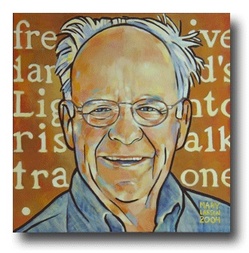 Today, Raymond Gerhardt Hunthausen, the emeritus archbishop of Seattle (1975-1991), celebrates his 91st birthday. He studied chemistry and later served as an assistant professor of Chemistry at Carroll College before becoming that school’s president in 1957. In 1962, Blessed John XXIII appointed him as bishop of Helena and from there he attended all four sessions of the Second Vatican Council. at 40 years old, he was the youngest bishop at the beginning of the Council. In 1975, the Servant of God Paul VI appointed Bishop Hunthausen to the See of Seattle. Hence, he’s been a priest for 66 years and a bishop for 50.
Today, Raymond Gerhardt Hunthausen, the emeritus archbishop of Seattle (1975-1991), celebrates his 91st birthday. He studied chemistry and later served as an assistant professor of Chemistry at Carroll College before becoming that school’s president in 1957. In 1962, Blessed John XXIII appointed him as bishop of Helena and from there he attended all four sessions of the Second Vatican Council. at 40 years old, he was the youngest bishop at the beginning of the Council. In 1975, the Servant of God Paul VI appointed Bishop Hunthausen to the See of Seattle. Hence, he’s been a priest for 66 years and a bishop for 50.
Saint Bernard Tolomei
-thumb-285x351-12511.jpg) An obscure Benedictine saint is liturgically honored by the Church today. Saint Bernard Tolomei, (1272-1348) the founder of the Benedictine Congregation of the Blessed Virgin of Monte Oliveto (near Siena) in 1319. He was beatified in 1644 but not canonized until 2009, though he was revered as a saint for a long time before Pope Benedict canonized him.
An obscure Benedictine saint is liturgically honored by the Church today. Saint Bernard Tolomei, (1272-1348) the founder of the Benedictine Congregation of the Blessed Virgin of Monte Oliveto (near Siena) in 1319. He was beatified in 1644 but not canonized until 2009, though he was revered as a saint for a long time before Pope Benedict canonized him.
Saint Pius X
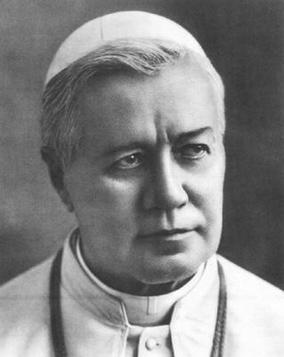 O God, who to safeguard the Catholic faith and to
O God, who to safeguard the Catholic faith and to
restore all things in Christ, filled Pope Saint Pius the Tenth with heavenly
wisdom and apostolic fortitude, graciously grant that, following his teaching
and example, we may gain an eternal prize.
of the purity of Christian doctrine. He’s one of those popes that really got
what it means follow the 5th century Saint Prosper of Aquitaine’s emphasis on the Liturgy as the heart of our faith, that is, to be “liturgical.” Pius knew the full value of the sacred Liturgy
as it forms our worship, believe system and life as Christians. He’s credited for
the renewal of our worship, the promotion of plainchant and beauty public
prayer. Most people will recall that Pius established the practice of early,
frequent and daily communion.
May 29, 1954.
Capuchin Friars open 84th General Chapter
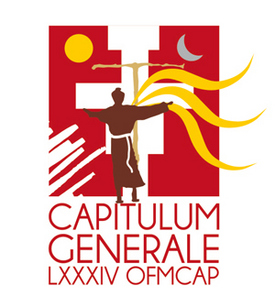 Beginning yesterday and for the next five weeks the Capuchin friars are engaged in their 84th General Chapter in Rome. The General Minister, Friar Mauro Jöhri presides over the Capitulars from many nations. The Capuchins have set a wonderful multilingual website to cover the work of the Chapter, pictures included. Walk with the Capuchins in friendship and prayer for a good meeting guided by the Holy Spirit.
Beginning yesterday and for the next five weeks the Capuchin friars are engaged in their 84th General Chapter in Rome. The General Minister, Friar Mauro Jöhri presides over the Capitulars from many nations. The Capuchins have set a wonderful multilingual website to cover the work of the Chapter, pictures included. Walk with the Capuchins in friendship and prayer for a good meeting guided by the Holy Spirit.
The Sacrifice of the Mass opening the Chapter was celebrated and preached by Capuchin Bishop John Corriveau former General Minister. It was reported that Bishop Corriveau, 71, said,


